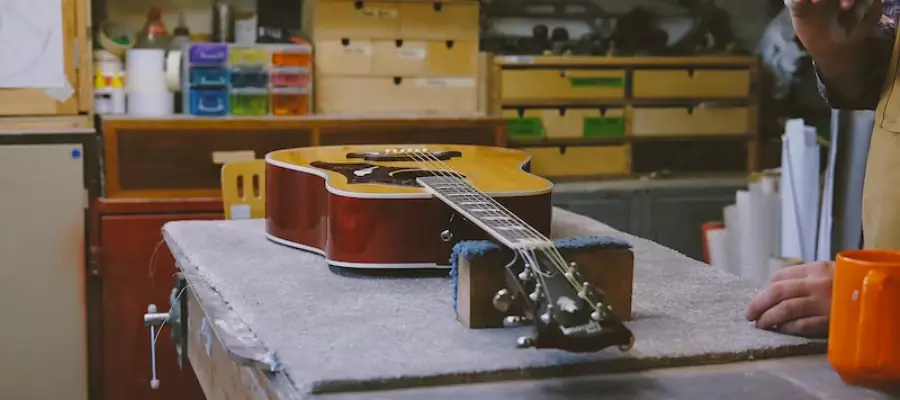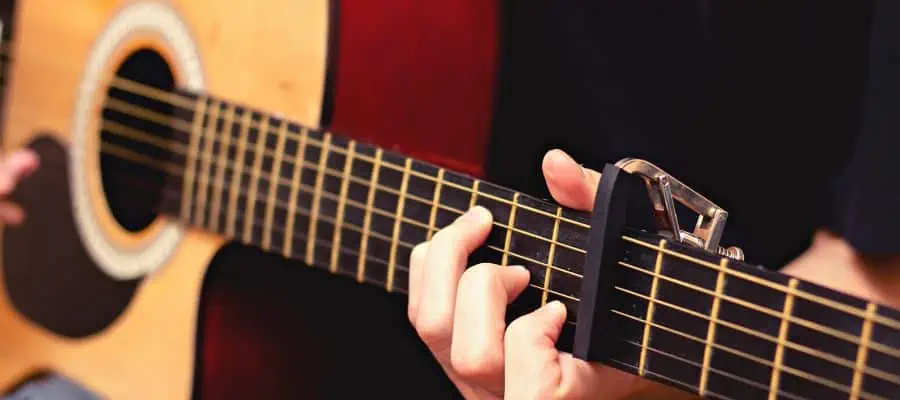Guitar buzzing can be a frustrating experience, especially when strumming chords that should ring out cleanly. It can ruin your enjoyment while playing and also affect your playing technique. There can be many reasons behind the buzz, but it is usually an easily fixable issue.
This unwanted noise usually stems from the guitar’s hardware interacting improperly with the strings. The most common culprit is fret buzz, which is caused when the strings vibrate against the frets due to low action or uneven fret height. Other factors such as technique, old strings, or loose hardware may also contribute to the buzz you’re hearing, but in most cases, it’s an issue that can be remedied with some attention to your instrument’s setup.
String gauge, neck curvature, and even the humidity in the room can be the reasons. Sometimes, it’s just a matter of adjusting your playing technique or ensuring your fingers are pressing the strings adequately against the fretboard. If the problem persists, it might be time to seek professional help or learn how to set up your guitar properly to avoid compromising its sound quality.
Buzzing doesn’t have to be the end of the world for your guitar’s sound. With a bit of detective work and minor tweaks, you can get back to a clean, buzz-free sound that lets your guitar’s true tone shine through. Keep in mind that playing comfort and instrument maintenance go hand in hand in preventing and fixing buzzing issues.
Common Causes of Guitar Buzz

When you’re strumming chords and you hear a buzz, it can result from a few issues with your guitar. These problems range from how the strings interact with the frets to aspects of your guitar’s setup.
Fret Wear
Your guitar’s frets, especially with frequent playing, can wear down over time. This wear can create uneven surfaces, leading to a buzzing sound when the strings come into contact with the worn frets as you play.
- Visual Inspection: Check for noticeable dips or grooves on frequently played frets.
- Feel: Run your fingers along the fret surfaces to detect rough or uneven areas.
Strings Hitting Frets
Sometimes, the strings make contact with the frets in a way that generates a buzz. This could be due to how you’re playing or a mechanical issue with how the strings are seated.
- Play Style: A lighter touch can prevent unwanted string contact.
- Check Fit: Ensure strings are properly seated in their respective nut and bridge slots.
Improper String Action
If your strings are too low, they’ll buzz against the frets. Conversely, if they’re too high, playing becomes harder.
- Measure Action: Use a ruler to check the distance between the strings and the fretboard at various points.
- Adjust Bridge: If the action is off, consider adjusting the bridge height accordingly.
The proper guitar action for electric guitars is usually around 1.5-2.0 millimeters (or 0.06-0.08 inches) at the 12th fret. Lower action values can make playing faster and easier but also lead to fretting buzz. For acoustic guitar, the action should be between 2.4 to 2.75 mm ( or 0.09 to 0.1 inches). However, different guitars and playing techniques require different values, so be sure to research before adjusting your instrument.
String action can change over time, so check it regularly. When you start to use a new string gauge, always check the action, as the string tension will affect the action.
Guitar buzz when playing chords is usually due to a combination of fret wear, string issues, or improper string action. By paying attention to these specific aspects of your guitar, you can identify and address the causes of buzz to ensure a cleaner sound.
Guitar Setup and Maintenance

When your guitar buzzes while playing chords, it’s often a signal that your instrument needs a bit of adjustment. Specific issues in the guitar’s setup and maintenance can lead to this unwanted noise. By paying attention to your guitar’s truss rod, nut and saddle, and overall health, you can minimize buzzing and ensure your chords sound clear and crisp.
Truss Rod Adjustment
The truss rod is a metal rod that runs along the inside of the neck of your guitar. It counteracts the tension of the strings and keeps the neck straight. If the neck has too much relief (bowing), the strings will sit higher away from the fretboard and could cause buzzing when playing chords. Conversely, if the truss rod is too tight, the neck may bow backward, lowering the action excessively and leading to the same issue. To adjust the truss rod:
- Check Neck Relief: Press the strings at the first and last frets. Look at the gap between the bottom of the strings and the top of the 8th fret. There should be a small gap, roughly the thickness of a business card.
- Adjust Truss Rod: Use the appropriate wrench to turn the truss rod. Turn clockwise to tighten (less relief) and counterclockwise to loosen (more relief). Make quarter-turn adjustments and recheck the gap.
Nut and Saddle Issues
The nut and saddle are critical to your guitar’s action and intonation. If either is not correctly set up, it can lead to fretting buzz:
- Nut: A nut with too deep slots will cause the strings to sit too low, resulting in buzzing at the first few frets. Slots that are too high can cause intonation issues and make the guitar difficult to play.
- Saddle: Similarly, a saddle that is too low can cause buzzing, especially when playing chords in higher positions. Intonation problems arise if the saddle is not positioned correctly.
You can change your nut or adjust the saddles to the proper height to prevent buzzing issues.
General Guitar Health
Maintaining the general health of your guitar ensures buzzing is kept at bay. This includes:
- Fret Condition: Worn or uneven frets can cause buzzing. Inspect the frets for signs of wear and consult a professional for a fret job if necessary.
- String Height and Cleanliness: Strings should be at the manufacturer’s recommended height. Dirty or old strings can also contribute to buzzing and should be changed regularly.
- Humidity and Temperature: Extreme changes can affect wood and, consequently, the setup of your guitar. Aim to store your guitar in a stable environment.
Techniques to Avoid Buzz

When playing guitar, you might find that unwanted buzzing accompanies your chords. It can be frustrating, but the good news is it’s often due to technique, which you can fix with some attention and practice. Let’s break down how proper fingering and the correct strumming and picking angles can make a world of difference to your sound.
Proper Fingering
Finger placement is key to ensuring clarity in your chords. Place your fingers just behind the frets, not on top or too far back. You’ll want to apply even pressure with your fingertips to avoid any buzzing or dead notes. It’s a balancing act:
- Too close to the fret: Might cause the string to buzz against the fret
- Too far: The string might not press down fully, leading to a buzz
Strumming and Picking Angles
The angle at which you strum or pick your guitar strings can also affect whether your chords buzz. Here’s what to check:
- Strumming: Ensure your pick strikes the strings squarely. Slanted or skewed strumming can cause strings to rattle against frets.
- Picking: When playing individual notes within chords, use a motion perpendicular to the string, aiming for a clean, direct sound without grazing adjacent strings or frets.
Conclusion
When your guitar buzzes as you strum chords, it’s often due to a few fixable issues. Your strings might be old or damaged, the guitar’s action could be too low, or the frets may be uneven. Sometimes, it’s simply a matter of technique, requiring you to press the strings firmly and properly behind the frets.
Quick Tips:
- Check String Health: Replace corroded or kinked strings.
- Assess Hardware: Tighten any loose parts.
- Fret Inspection: Look for uneven frets that need attention.
- Action Adjustment: Raise the string action if it is too low.
- Technique: Practice pressing strings correctly and with enough strength.
Remember, addressing guitar buzz involves a mix of maintenance and skill development. By identifying and resolving these common issues, you can work towards a clearer, richer sound when playing chords on your guitar.
If you found this article useful, you may want to save this pin below to your Guitar board.

Recent Posts
Some guitarists insist on buying an expensive amplifier with their electric guitar. They assume that this is a must for every type of guitarist out there. However, in some situations, this isn’t...
Top 50 Free Realistic Guitar VST Plugins With Sound Examples
As technology has rapidly advanced in the recent decade, computers are stealing more and more roles from physical musical instruments and accessories. Nowadays, you do not need expensive amps,...

